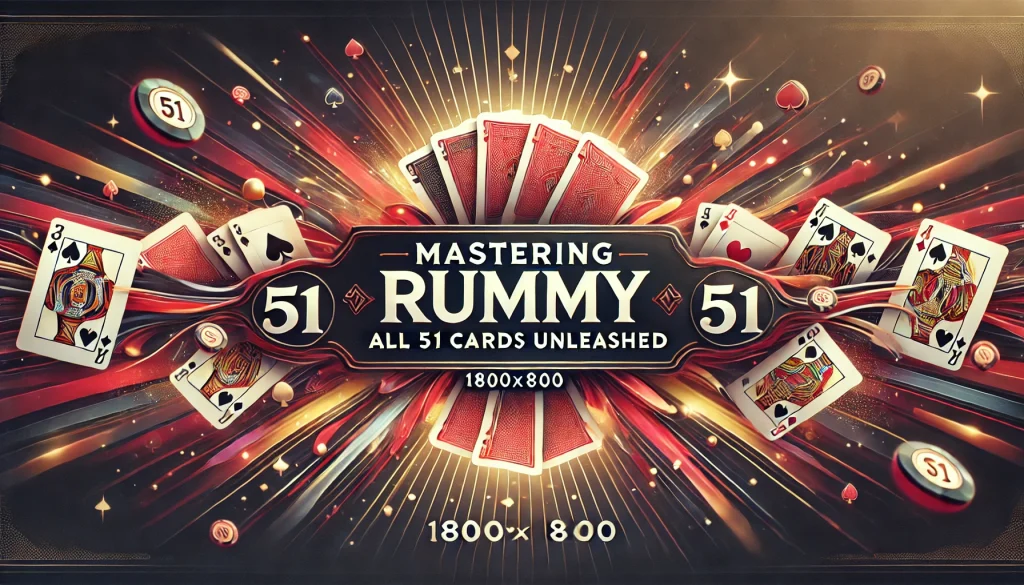Description

Rummy: An All-Inclusive Guide to rummy culture Mastering the 51-Card Game The combination of skill, strategy, & chance in the well-known card game rummy has enthralled players worldwide. Forming sets & sequences out of a card hand is the fundamental activity of the game. The goal is to merge cards into legitimate combinations, which can be runs (three or more consecutive cards of the same suit) or sets (three or four cards of the same rank).
Due to its ability to accommodate two or more players, the game is a flexible choice for social events and get-togethers. 777 slots Depending on the particular variation being played, there can be significant variations in the rules of Rummy. Nonetheless, the basic ideas are the same for the majority of forms. As they take turns drawing and discarding cards, players try to get better hands while watching Classic 777 Slots APK what their opponents do.
When a player successfully melds all of their cards, the game usually ends. At that point, a showdown is held, during which points are determined by the number of unmelded cards still in the opponents’ hands. It is essential for anyone wishing to learn more about the game of rummy to comprehend these fundamentals. Certain Rummy variations use a 51-card deck, which adds special dynamics to the game.
One card, usually a joker or a particular rank, is usually left out of the 51-card deck in contrast to the standard 52-card deck, which has four suits of thirteen ranks each. This change may have a big effect on gameplay tactics and the game’s overall flow. Because players must modify their strategies to account for the missing piece, the absence of a card can make the game more difficult. Players need to pay close attention to which cards are available and which are not when playing 51-card rummy. Because the absence of a card can alter the likelihood of forming specific combinations, players must monitor which cards have been played & which are still in the deck.
Because players may need to modify their strategies in response to the game’s changing conditions, this increased awareness can result in more strategic gameplay. Mastering Rummy with 51 cards requires knowing how to use this modified deck. There are numerous variations of rummy, each with its own set of rules and tactics. Indian Rummy, Kalooki, and Gin Rummy are a few of the most well-liked variations. Players must modify their strategies to meet the unique challenges presented by each variation.
Gin Rummy, for example, is usually played with two players and stresses making melds fast, whereas Indian Rummy frequently has more players and permits more intricate melding. However, Kalooki adds extra components like wild cards and unique scoring schemes that can drastically change the game. Since these variations require different skills and strategies, it is essential for any serious Rummy player to understand them. Gamers who are proficient in several variations of rummy can adjust to various gaming settings & opponents more readily, improving their overall gaming experience.
Having successful strategies is crucial when playing Rummy with a 51-card deck. One important tactic is to monitor the cards you have and the ones your opponents have discarded. Because of this awareness, you can predict their possible moves & modify your own approach accordingly.
An opponent may not be pursuing that suit for their melds if you observe them discarding cards from that suit, for instance. This lets you concentrate on gathering those cards for your own hand. Making early meld formation a priority is another crucial tactic. By concentrating on forming runs or sets as quickly as you can, you can lower the quantity of unmelded cards in your hand and lessen the chance that an opponent will go out. Also, if your opponents manage to go out before you do, you can avoid losing important points by holding onto high-value cards until you are closer to finishing your melds.
It takes both strategic thinking and flexibility to create winning hands in rummy. As soon as you get your cards, one good strategy is to arrange your hand into possible melds. You can better see your options and decide which cards to keep or throw away thanks to this organization. For example, it might be prudent to keep the cards that are in sequence while discarding the ones that don’t support your overall plan if you are missing one card that is necessary to finish a run.
Observing your opponents’ discards is an additional helpful strategy. An opponent may be attempting to avoid something or have a strategy if you observe that they routinely discard particular ranks or suits. You can decide which cards to keep or throw away on your own by using this information to your advantage. In addition, think about strategically employing wild cards, which can be useful tools for finishing melds but should be used sparingly to optimize their effect. Players can use sophisticated strategies to outplay their rivals as they get more proficient at Rummy with a 51-card deck. Card counting is one such method, which entails monitoring which cards have been played and which are still in the deck.
With the help of this ability, players can predict what cards their opponents might be holding and modify their strategy accordingly. Bluffing & misdirection are two more sophisticated strategies. You can confuse opponents & interfere with their strategies by discarding cards that might give the impression that you are pursuing one meld while actually working toward another. This psychological element of rummy gives the game a thrilling new dimension and can be especially useful when playing against less seasoned opponents who might not be aware of your strategies. When using a 51-card deck to play Rummy, even experienced players can make common mistakes. Failing to modify tactics in light of the special dynamics of the modified deck is a common mistake.
When confronted with the subtleties brought about by the missing card, players who rely too much on tactics appropriate for a typical 52-card game may find themselves at a disadvantage. Not keeping track of opponents’ melds and discards is another error. Ignoring other people’s actions can result in lost opportunities or bad choices about which cards to keep or discard. Some players may also become so preoccupied with finishing their own melds that they neglect defensive play, which can lead to opponents being able to go out before they have had a chance to strengthen their hands.
Consider holding frequent practice sessions with a variety of opponents to improve your 51-card rummy skills. By competing against players of varying skill levels, you will be exposed to a variety of tactics and play styles, which will help you gradually improve your own strategy. Also, taking part in regional competitions or online forums can offer insightful knowledge about sophisticated gaming strategies.
You can also learn more about Rummy strategies by studying materials like books or online tutorials. You can get fresh ideas for your gameplay by observing expert players or analyzing professional matches. By consistently pursuing knowledge and improving your abilities, you can become a formidable Rummy player who can handle even the most difficult situations that a 51-card deck may present.lottery sambad old

